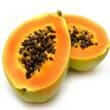Background
- Papaya (Carica papaya) is a fruit-bearing tree grown in tropical regions around the world. Commonly eaten parts of the plant include the fruit and leaves. Traditionally, juice from the papaya fruit and root has been used to treat boils, burns, and warts. The leaves have been used to treat ulcers and, together with papaya seeds, intestinal parasites. Unripened papaya fruit also has been used for wound healing, colds, and indigestion; the roots and seeds have been used for hemorrhoids and to induce abortion. Papaya also has been used as a folk remedy for birth control and as a digestive aid.
- The fruit and leaves contain the protein-digesting enzymes papain and chymopapain, which have been isolated and studied for their effects on injured skin tissue. Results of research suggest that the papaya fruit, enzymes, and seed extracts may have other therapeutic properties such as anticancer, antifungal, antiparasitic, blood lipid-lowering, blood sugar-lowering, birth control, and immune system effects. Despite a wealth of positive early research, high quality human trials supporting the use of papaya for any human condition remain lacking.
References
- Aruoma OI, Colognato R, Fontana I, et al. Molecular effects of fermented papaya preparation on oxidative damage, MAP Kinase activation and modulation of the benzo[a]pyrene mediated genotoxicity. Biofactors 2006;26(2):147-159.
View Abstract - Breithaupt DE, Weller P, Wolters M, et al. Plasma response to a single dose of dietary beta-cryptoxanthin esters from papaya (Carica papaya L.) or non-esterified beta-cryptoxanthin in adult human subjects: a comparative study. Br J Nutr 2003;90(4):795-801.
View Abstract - Danese C, Esposito D, D'Alfonso V, et al. Plasma glucose level decreases as collateral effect of fermented papaya preparation use. Clin Ter 2006;157(3):195-198.
View Abstract - Giuliano AR, Siegel EM, Roe DJ, et al. Dietary intake and risk of persistent human papillomavirus (HPV) infection: the Ludwig-McGill HPV Natural History Study. J Infect Dis 2003;188(10):1508-1516.
View Abstract - Jayarajan P, Reddy V, and Mohanram M. Effect of dietary fat on absorption of beta carotene from green leafy vegetables in children. Indian J Med Res 1980;71:53-56.
View Abstract - Lohiya NK, Kothari LK, Manivannan B, et al. Human sperm immobilization effect of Carica papaya seed extracts: an in vitro study. Asian J Androl 2000;2(2):103-109.
View Abstract - Marotta F, Weksler M, Naito Y, et al. Nutraceutical supplementation: effect of a fermented papaya preparation on redox status and DNA damage in healthy elderly individuals and relationship with GSTM1 genotype: a randomized, placebo-controlled, cross-over study. Ann NY Acad Sci 2006;1067:400-407.
View Abstract - Marotta F, Yoshida C, Barreto R, et al. Oxidative-inflammatory damage in cirrhosis: effect of vitamin E and a fermented papaya preparation. J Gastroenterol Hepatol 2007;22(5):697-703.
View Abstract - Martin T, Uhder K, Kurek R, et al. Does prophylactic treatment with proteolytic enzymes reduce acute toxicity of adjuvant pelvic irradiation? Results of a double-blind randomized trial. Radiother Oncol 2002;65(1):17-22.
View Abstract - Miyoshi N, Uchida K, Osawa T, et al. Selective cytotoxicity of benzyl isothiocyanate in the proliferating fibroblastoid cells. Int J Cancer 2007;120(3):484-492.
View Abstract - Ncube TN, Greiner T, Malaba LC, et al. Supplementing lactating women with pureed papaya and grated carrots improved vitamin A status in a placebo-controlled trial. J Nutr 2001;131(5):1497-1502.
View Abstract - Otsuki N, Dang NH, Kumagai E, et al. Aqueous extract of Carica papaya leaves exhibits anti-tumor activity and immunomodulatory effects. J Ethnopharmacol 2010;127(3):760-767.
View Abstract - Owoyele BV, Adebukola OM, Funmilayo AA, et al. Anti-inflammatory activities of ethanolic extract of Carica papaya leaves. Inflammopharmacology 2008;16(4):168-173.
View Abstract - Tuekpe MK, Todoriki H, Sasaki S, et al. Potassium excretion in healthy Japanese women was increased by a dietary intervention utilizing home-parcel delivery of Okinawan vegetables. Hypertens Res 2006;29(6):389-396.
View Abstract - Zhang J, Mori A, Chen Q, et al. Fermented papaya preparation attenuates beta-amyloid precursor protein: beta-amyloid-mediated copper neurotoxicity in beta-amyloid precursor protein and beta-amyloid precursor protein Swedish mutation overexpressing SH-SY5Y cells. Neuroscience 2006;143(1):63-72.
View Abstract







